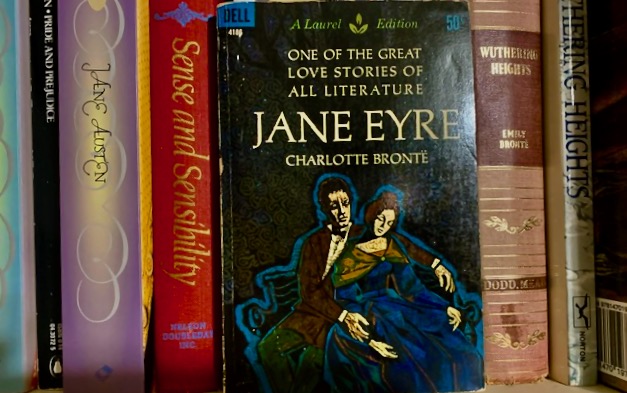Okay, well, this was a no-brainer. Charlotte Bronte’s novel has been a favorite with both critics and readers ever since its publication in 1847 under her pen name of “Currer Bell.” The novel has been adapted as a stage play, several film and television versions, and two operas, and has inspired popular literature as varying as Jean Rhys’s serious post-colonial novel Wide Sargasso Sea and Jasper Fforde’s comic parallel-universe novel The Eyre Affair. It ranked as #10 on the BBC’s list of 100 Greatest British Novels in 2003, and came in at #9 on Penguin Classics’ list of “100 Must-Read Classics” as voted on by their readers. Both the Guardian’s 2015 list of the 100 best novels written in English and the Observer’s 2003 list of the 100 greatest novels of all time included Jane Eyre in their compilations. And Ms. C. Bronte’s novel is number 12 on my list of the “100 Most Lovable Novels in the English Language.”
Part of the reason for the novel’s wide appeal is that, even though it is essentially a realistic novel, it has the structure and motifs of fairy tale or myth, and therefore appeals to that part of our psyche that responds almost instinctively to archetypal literary patterns. Jane’s story is essentially a Cinderella story, in which the poor orphaned girl, tormented by her wicked stepmother, winds up with the wealthy and powerful prince. There are also elements, of course, of the Bluebeard story, in which the madwoman in the attic at Rochester’s Thornfield Hall stands in for Bluebeard’s murdered wives in the closet. And so it’s also a Beauty and the Beast story—though Jane is hardly a beauty and the brooding Rochester not a complete beast, it is she who humanizes him in the end.
Another chief reason for readers’ affection for Jane is probably Bronte’s revolutionary use of point of view in the novel. It may be an exaggeration to say that this is the first Bildungsroman—a novel of spiritual growth and maturity—recorded as a first person narrative, but it is certainly the most effective early use of that point of view, and influenced later writers from Joyce to Marcel Proust. We see how every event impacts Jane’s evolving consciousness, and we react with her to the major changes in her situation.
The novel is typically seen as falling into five sections, each of which is associated with a different setting and each of which is dominated by a particular mood made manifest by Jane’s emotional narrative. In the beginning of the novel, the young Jane lives a Cinderella life at Gateshead, largely excluded from her uncle’s family, and the tone of her narrative is passionate and sometimes irrational. At Lowood Institution for poor and orphaned girls, where Jane lives a regimented institutional life, the mood and tone of her words is much colder and more restrained. At Thornfield, Mr. Rochester’s manor, where she goes to work as a governess but eventually nearly becomes her master’s wife, the tone wavers between passionate, curious, and controlled as her feelings move between her burgeoning love for Rochester, puzzlement at the strange events that happen in his house, and her disappointment and shock when her wedding fails to happen. At Moor House the tone darkens again and is more constrained and even oppressive. But in the last section, at Ferndean, the tone moves from fearful to ultimate happiness. The reader rides this roller coaster with Jane from a front row seat inside her own consciousness.
Of course, perhaps the chief interest of Jane Eyre for a lot of contemporary readers is what might be called its incipient feminism. It’s been called the world’s first feminist novel. Bronte doesn’t put in any blatant calls for suffrage or for access to equal education or professional opportunities, but she does create a woman character who goes beyond being a simple domestic “angel” and demonstrates a good deal of agency in her life. This comes to the forefront in her classic response to Rochester’s unfeeling proposal:
“Do you think I am an automaton? — a machine without feelings? and can bear to have my morsel of bread snatched from my lips, and my drop of living water dashed from my cup? Do you think, because I am poor, obscure, plain, and little, I am soulless and heartless? You think wrong! — I have as much soul as you — and full as much heart! And if God had gifted me with some beauty and much wealth, I should have made it as hard for you to leave me, as it is now for me to leave you. I am not talking to you now through the medium of custom, conventionalities, nor even of mortal flesh: it is my spirit that addresses your spirit; just as if both had passed through the grave, and we stood at God’s feet, equal — as we are!”
If you have no other reason to read Jane Eyre, read it just so you can get to this quotation and read it in context. You’ll see why there’s no question as to why this book should be on my best-loved list.

